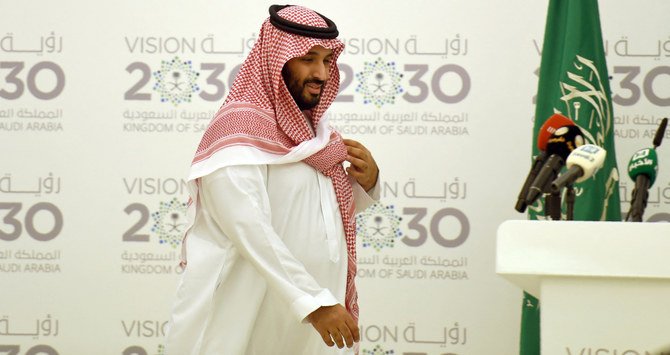
- ARAB NEWS
- 01 Jul 2025

Following the collapse of oil prices in mid-2014 and growing pressure to balance the fiscal budget, the Saudi leadership, headed by King Salman and Crown Prince Mohammed bin Salman, launched Saudi Vision 2030.
Vision 2030 aimed to reduce Saudi Arabia’s dependence on oil revenue, transform and diversify the economy, and improve public sector services.
Crown Prince Mohammed Bin Salman observed that Vision 2030 is an ambitious yet achievable blueprint that expresses Saudi Arabia’s long-term goals and expectations, and reflects the Kingdom’s strengths and capabilities. Achieving Vision 2030 is based on three strong pillars: A vibrant society, a thriving economy and an ambitious nation.
The strategic concept of Vision 2030 in its infancy called for change to tackle the inevitable challenges brought about balancing the fiscal budget and addressing the collapse of oil revenues.
Knowing the problem is half of the solution, so the leadership conferred with international consultants to achieve the ambitious goals of Vision 2030.
Consultants and experts delivered a state-of-the-art strategy. The long-term vision requires agile, efficient, motivated, well educated and experienced individuals, in order to strengthen and achieve the programs and initiatives.
Before the launch of the long-term vision, public sector services often failed to meet the expectations of citizens in delivering satisfactory services.
But to achieve the goals and objectives of Vision 2030, the Saudi leadership trained civil servants and employees, and recruited private sector executives to lead the transformation.
One of the main factors in enabling private sector leaders to transition into the public sector was the opportunity to be part of a transformation that would impact the Kingdom and region at large.
They wanted to be part of a team that builds a future for the new generations to come, and they saw significant opportunities to learn and grow by being a part of government.
The typical challenges that face private sector leaders moving to the public sector are the extensive processes, policies and procedures required to achieve change. Leaders need to learn and re-learn government office protocols and communications. They need to learn the procedures to receive approval from multiple levels of the government’s chain of command. And finally, they need to learn how to work with public sector stakeholders.
Achieving Saudi Vision 2030 and the associated restructuring of government institutions has led to several dramatic shifts in public sector institutions.
Dr. Turki Faisal Al-Rasheed
One policy shift that created organizational change involved the end of a damaging stereotype of civil servants: That they work fewer hours and are less productive than private sector workers. Now, civil servants and young people are motivated to work long hours and want to be part of Vision 2030’s success.
Institutions have also reformed, and are providing outstanding services with dignity to service receivers. Outdated bureaucratic processes were removed when the government provided e-services to citizens and residents. Now it is all available online.
Civil servants have become better public servants and agile leaders, and there has been a notable increase in coordination between various institutions. The shift in civil servants’ capability and capacity to deliver programs and initiatives has been enormous. We can see the success reflected in public health, e-services and e-commerce, and good information technology. What Vision 2030 created is coordination and support for one another.
Some of the successes of Saudi Vision 2030 are manifested in the leadership’s dedication to delivering successful programs. This is evident in the recently published 2021 World Happiness Report, where Saudi Arabia ranks first in the Arab world and 21st globally, according to the UN Sustainable Development Solutions Network.
Saudi Arabia maintains high levels of confidence as one of the most trusted governments in the world, according to the results of Edelman’s 2021 Trust Barometer report, which saw trust in the Kingdom’s government grow from 78 percent in January 2020 to 82 percent in January 2021.
All told, Saudi Vision 2030 has been a success so far, and we look forward to this continuing.